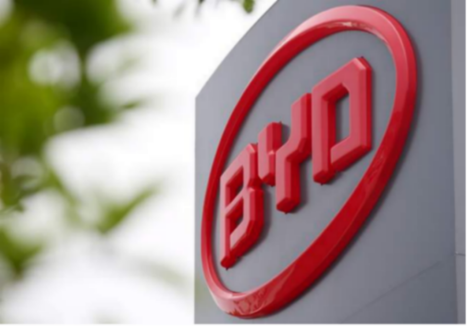
By Greg Gao
Chinese leading EV maker BYD will adopt global AI giant NVIDIA’s DRIVE Hyperion computing architecture in its new EVs for autonomous driving and parking from the first half of 2023, the company announced on March 23.

BYD said that the cooperation will combine their unique advantages in electric vehicles and artificial intelligence. It is an important joint effort to promote the production and deployment of environmentally sustainable EVs that become increasingly intelligent with over-the-air software updates.
“Software-defined autonomy and electrification are some of the driving forces behind the automotive industry’s transformation. Through the power of AI and the NVIDIA DRIVE platform, BYD will deliver software-defined EV fleets that are not only safe and reliable but also improve over time,” said Rishi Dhall, Vice President of Automotive, NVIDIA.
The cooperation will also involve NVIDIA DRIVE Orin SoC (system-on-a-chip), which is an industry-leading automotive-grade chip. It delivers 254 TOPS (trillion operations per second) and is the central computer for intelligent vehicles. It’s the ideal solution for powering autonomous driving capabilities, confidence views, digital clusters, and AI cockpits. The scalable DRIVE Orin product family lets developers build, scale, and leverage one development investment across an entire fleet, from Level 2+ systems to Level 5 fully autonomous vehicles, according to NVIDIA.
The DRIVE Orin also has high-speed peripheral interfaces and high memory bandwidth (205GB/s), and can seamlessly process data from multiple sensors to achieve a safe and reliable driving experience. NVIDIA DRIVE Orin chips comply with ISO 26262 ASIL-D and other systematic safety standards to ensure the safety and advancement of intelligent driving.
In addition to cooperating with supply chain companies in the industry, BYD itself is also making a big bet on automotive semiconductors. In 2004, BYD invested RMB300 million($47 million) to establish a wholly-owned subsidiary, Shenzhen BYD Microelectronics (the predecessor of BYD Semiconductor), to engage in the production, operation, and sales of integrated circuits. It has two production bases in Shenzhen and Ningbo. Since its establishment, BYD Semiconductor has been promoting the development of semiconductor business in the fields of industry, home appliances, new energy, consumer electronics, with automotive semiconductors as its core.
In power ICs, BYD Semiconductor adopted an IDM model, covering the entire industry chain from chip design, wafer manufacturing, module packaging and testing to system-level application testing. According to statistics from consultancy firm Omdia, BYD Semiconductor ranks second among global manufacturers of IGBT modules for EV motor drive controllers, only behind Infineon, with a market share of 19%, ranking first among China’s domestic manufacturers.
Based on high-quality management and control capabilities, BYD Semiconductor’s industrial MCU and automotive MCU have been mass-produced, with rapid sales growth. The company’s cumulative shipments of automotive MCU occupy a leading position among China’s domestic manufacturers, according to Omdia.
BYD Semiconductor is preparing its IPO. Its application to be listed on ChiNext, a NASDAQ-style board of the Shenzhen Stock Exchange, has been approved by the Exchange’s review committee meeting, according to a recent announcement on the Shenzhen Stock Exchange's website.
RELATED
-
BYD plans to establish a sodium-ion battery plant in eastern China’s Xuzhou with an investment of RMB10 billion ($1.4 billion)
11-20 17:51 -
European Commission President von der Leyen will visit China in wake of the EU’s ongoing probe into China’s subsidies on EV industries
11-20 16:59 -
Chinese auto giant Changan Automobile plans to launch eight self-developed battery cells in the future
11-20 16:26
READ MOST

No Data Yet~







